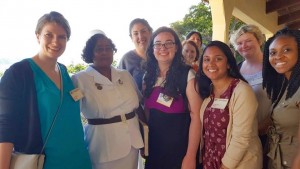A “First-in-a-Lifetime” Experience
By: Nora Carr, BSN, RN
For ten days this past March, I traveled to Grenada with a group of fellow nurse practitioner students and faculty members from Regis College. Nurses and students tend to naturally be inquisitive and as a student NP and first-time visitor to the Caribbean country of Grenada, I was curious about many things. What types of medical problems would be predominant? How do Grenadians typically access healthcare? What is life like on the island? I had questions about everything from philosophical approaches to healthcare to logistical details like how to catch a bus. One thing I knew from the beginning was that my Boston-centric view of healthcare (and the world) would be challenged, and for that I was grateful. I have been fortunate enough to have traveled internationally on prior occasions, but this trip would be different. Travelling in a professional nursing capacity was an once-in-a-lifetime opportunity not to be missed.
Our trip was affiliated with the medical and nursing schools of St. George’s University, and we attended lectures and practical skills labs at the school. We were paired up with physicians at the school’s health services to provide care for students, staff and their families. Seeing patients in this setting felt similar to the way that patients are seen in clinics that I have seen in the Boston area, although there were many important differences. One major difference is that many health services are free, although some diagnostics such as labs or imaging are paid for directly by the patient. However these costs are much lower than they would be in the U.S. This was also true at the local Planned Parenthood chapter, which provides women with birth control and reproductive health services. For example, a pap smear costs around $15 USD. Some Grenadians choose to have private health insurance, but it is not mandatory. Therefore, there is a stark contrast in the amount of time spent filing paperwork, which in the U.S. is often a drain on the resources of clinics and private practices. Another difference is that the technology on the island is limited. There are no mammogram machines on the island, nor a cardiac catheterization lab, or a hyperbaric chamber. There are only two hemodialysis machines on the island. I take so many of these resources for granted in the U.S, and at first I couldn’t comprehend how people are able to get the care they need without these vital technologies. I was told that people can travel to Trinidad for some of these treatments/tests. However in other cases, diagnoses are made on the strength of the clinical assessments of the providers. Many common health problems are treated empirically, without the confirmatory tests that we often order in the U.S. It really made me question whether the so-called “million-dollar-workup” that we use in the U.S. could be done at a lower cost, or if it is always needed for commonly occurring conditions.
As nurses, we are always concerned with the activities of daily living as well as the independence level of our patients. I found that the social support network seems to be stronger for Grenadians, as families are usually the sole provider of caregiver services for their loved ones. Skilled nursing facilities are rare, and when I would ask questions such as “Who shops for the groceries?” “Who does your laundry?” I often got puzzled looks as people replied that their families helped with these things, of course. Families support one another by providing housing, meals and childcare for all, even if- and especially if- their family members are physically or mentally ill.

Regis College NP students with the matron nurse of St. George’s General Hospital in Grenada.
My favorite parts of the trip were when we were able to provide care to Grenadians in rural communities. We worked with medical students to provide breast exams to residents of a psychiatric hospital. We accompanied nursing students to perform home visits for their neighbors. We provided many types of screening services in a local health fair organized by the nursing school. All of these experiences helped me to understand the universality of providing care. Through this community work, I found that although cultures and treatment approaches may be different, diabetes, hypertension and arthritis dominate the health concerns of Grenadians and Bostonians alike.
Being in another culture while providing care helped me to think outside the box when providing health education, and helped me to re-evaluate the context in which I provide examples or guidance. Meeting new people helped me to reflect on how I may be more welcoming to people who are new to Boston or the US. Learning about the extensive training that nurses receive made me reflect on my own education, and made me consider how I will continue to seek out learning opportunities as I embark on my career. Finally, this experience made me realize that a global health nursing trip need not be a “once-in-a-lifetime” experience. It is my hope that for me, this trip will have been a “first-in-a-lifetime” experience.